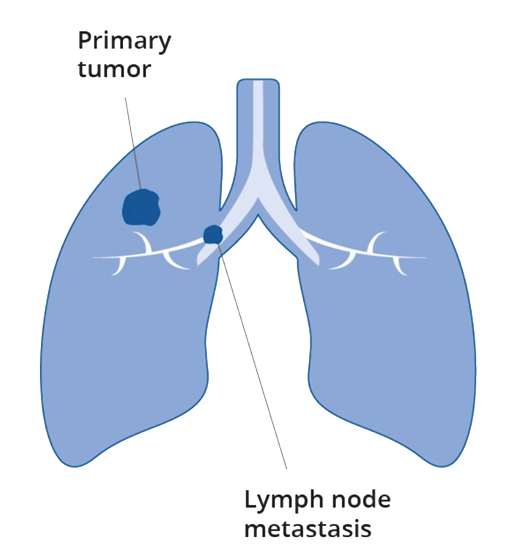- Limited Stage Lung Cancer
Overview
Limited Stage SCLC lung cancer diagnosis means the tumor is located on one side of your chest and can be safely treated with surgery or radiotherapy.
At this stage of the disease, the cancer has not spread to the other lung or any other organ in your body.
What Tests Will I Need and Why?
Blood and Imaging tests are done to understand your general health, confirm your diagnosis and determine your cancer stage.
Tissue analysis is also typically done to identify the cancer cell type, which is critical to finding the best treatment option for you.
If your treatment team has not already performed tests to determine your cancer’s features, please ask your doctor when these tests will be performed.
Re-read this summary as needed and then tap, “Compare My Treatment Options Now“. Our unique Comparison Page will help you understand your FDA-approved treatment options including, who can help you pay for your treatment, where and how each is given and what side-effects you may experience.

National Institute of Health/ treatment-lung
Recommended Lung Cancer Videos

Understanding Small Cell Lung Cancer
Brought To You By Black Health Matters

SCLC & Immunotherapy
Is Immunotherapy Right for Me?

Treatment & Management of SCLC
Understand Your Treatment Options

How Does Cancer Spread?
What Does Metastastis Mean?

Diagnosing Your Cancer
How Does a CT Scan Work?

Exercise! You Can Do It!
Reduce Your Side Effects & More
Commonly Searched Questions
Limited Stage Lung Cancer Symptoms
- Breathlessness
- Cough for a long time
- Feeling weak
- Coughing up blood
Source: Cancer.org
Limited Stage Lung Cancer Treatment
- Surgery. This includes removing part of the lung or a whole lobe of the lung that is affected
- Chemotherapy before or after surgery
- Radiotherapy before or after surgery
Source: Cancer.org
Limited Stage Lung Cancer Survival Rate
Source: Cancer.gov
Limited Stage Lung Cancer Recurrence Rate
Source: Cancer.org
Limited Stage Lung Cancer Prevention
- Avoid Smoking: The most effective way to prevent lung cancer is to never smoke. If you currently smoke, quitting significantly reduces your risk.
- Avoid Secondhand Smoke: Minimize exposure to secondhand smoke to decrease risk.
- Reduce Exposure to Carcinogens: Limit exposure to known carcinogens such as asbestos and radon. Ensure proper ventilation and use protective equipment if you work with hazardous substances.
- Healthy Diet: Maintain a diet rich in fruits and vegetables to support overall lung health.
- Regular Exercise: Engage in regular physical activity to support overall health.
- Regular Screenings: For individuals at high risk (e.g., heavy smokers or those with a family history of lung cancer), consider regular screenings with low-dose CT scans to detect lung cancer at an earlier, more treatable stage.
Source: Cancer.org
Limited Stage Lung Cancer Definition
Source: Cancer.gov














